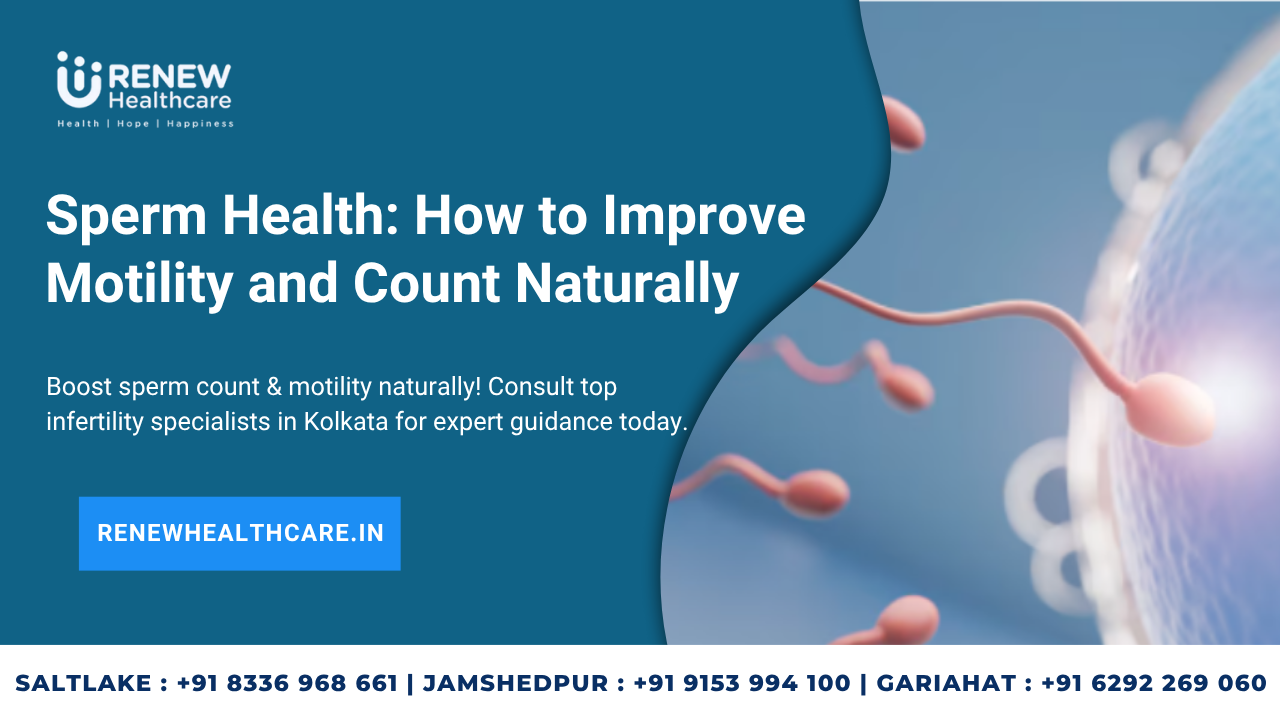
Male fertility is closely associated with the health of sperm. A healthy sperm count and strong motility are essential for achieving pregnancy. Poor motility or low sperm count can result from various factors, whether it comes to underlying health conditions or lifestyle choices. However, according to any infertility specialist in Kolkata, both of these can be corrected through various natural methods with no need for any medical intervention.
Diet has a major role in improving reproductive health. Foods rich in nutrients can impact the production, quality and motility of sperms. With antioxidants like vitamin E and C can help fight oxidative stress, which is a top cause for sperm damage. Bell peppers, strawberries and citrus fruits, packed in Vitamin C, help prevent cellular damage of sperm and can support its overall motility. Consuming leafy greens, seeds, nuts etc, rich in Vitamin E, can complement the effects of Vitamin C and can boost sperm vitality further.
Men can also boost their testosterone levels and sperm production with Zinc, an essential mineral. Foods packed in zinc like eggs, legumes, shellfish, and red mea,t can be useful. Whole grains, Brazil nuts and other selenium-rich foods help improve sperm morphology and motility.
It is also a good idea to avoid processed foods and follow a diet rich in whole foods. Healthy fats, as can be found in olive oil and avocados, fresh vegetables, whole grains and lean proteins, improve hormonal balance and reproductive health. Mackerel, salmon and other fatty fishes rich in Omega-3 fatty acids can help improve sperm movement and fluidity.
The overall male reproductive function, testosterone levels and circulation can improve with regular physical activity. According to studies, men who indulge in moderate workouts quite a few times every week can have better sperm motility and count than those who follow a sedentary lifestyle.
However, it is essential to follow a balanced approach. Too much of exercising, especially the use of anabolic steroids or doing intense endurance training can affect sperm production and disrupt hormonal balance in the male body. Even a casual walk for 30 minutes every day can make a big difference to sperm health. Combining flexibility exercises with strength training can improve hormonal stability and overall wellness.
Related article: Best Exercises to Boost Male Fertility Naturally
When there is chronic stress, the body releases a hormone known as cortisol. It disrupts the body’s normal testosterone production process. Over time, high stress levels can suppress libido, disrupt sleep, and reduce sperm quality. Men can counter these issues with deep breathing, yoga, meditation or by indulging in hobbies that make them happy.
Sleep is equally important. With 7 to 9 hours of quality sleep per night, men can enjoy optimal hormonal function, enough testosterone production, proper sperm count, effective sperm motility and better overall physical health, reducing the need for infertility treatment in Kolkata.
In modern life, there is heavy pollution in the environment. There are also toxins and harmful components in some foods that are produced with heavy pesticide use, recreational drugs such as cocaine, marijuana and anabolic steroids. These can reduce sperm production, impact sperm count, impair motility, affect sperm function, damage DNA in sperm cells, and have a negative impact on overall male reproductive health. By reducing exposure to these environmental and lifestyle hazards, men can boost fertility as well as overall health.
Staying well-hydrated is vital for the production of healthy semen, which is mostly water. Dehydration can result in reduced semen volume and thicker consistency, making it harder for sperm to swim efficiently. When considering fertility options, understanding the IVF treatment price can help couples plan their journey.
Prolonged exposure to heat—such as from hot tubs, saunas, or even placing a laptop on the lap—can impair sperm production. Wearing loose-fitting underwear and avoiding excessive heat exposure can help maintain the optimal temperature for sperm health.
With proper strategies and treatment, it can be easy to improve both sperm count and sperm motility. Men should consult a qualified infertility specialist in Kolkata for proper guidance and to increase the chances of conception.
Men can improve sperm count and motility naturally with proper stress management, reducing heat exposure to the testicles, avoiding smoking and excessive alcohol intake, following a balanced diet and doing regular exercise.
With a nutrient-rich diet, sperm production can be improved and hormone balance can be supported. It may contribute to enhancing the quality of sperm.
Sperm health can get proper support with supplements like selenium, zinc, vitamin E, vitamin C, folic acid, and CoQ10.
Typically, men can start to see improvements within 2 to 3 months, which align with the sperm production cycle.
During IVF, you may hear terms like "Grade A embryo," "blastocyst quality," or "ICM and TE grading." Many couples feel...
The IVF journey can be one of the most emotionally intense experiences a couple faces. From hormone injections and medical...
Planning a pregnancy is one of the most meaningful steps in your life — but the journey doesn’t begin only...
Meet Priyanka, a busy marketing professional. Lately, her periods have become heavy and unpredictable. Cramping disrupts her workday, and she’s...
Role of IVF in Overcoming Infertility Challenges in Endometriosis Endometriosis is an often painful disorder in which tissue similar to...
Journey towards parenthood Infertility and childlessness can be challenging journeys for couples to navigate. The emotional and physical toll of...
The "Save the Sibling" Program "Save the Sibling" program, a collaboration of Renew Healthcare, Cordlife, and HCG EKO offers hope...
What is PCOD? PCOD, also known as Polycystic Ovary Syndrome, is a common hormonal disorder that affects women of reproductive...
Intrauterine insemination aka IUI is a common fertility treatment that many couples opt for having a biological child. The experts...
Getting sperm by any means for fertility purposes is known as sperm extraction. There are several ways to get sperm,...
